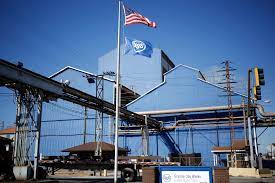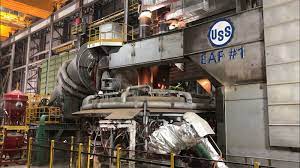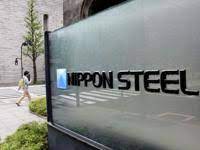In a seismic shift in the global steel industry, Japanese steel behemoth Nippon has unveiled its audacious plan to acquire US Steel in a blockbuster deal worth a staggering $15 billion (£12 billion).
This move is poised to create one of the world’s largest steel conglomerates outside of China, marking a pivotal moment in the destiny of the iconic US firm.
The announcement comes after months of speculation and strategic maneuvering, as US Steel sought a suitable buyer since August, rejecting a smaller bid from a domestic rival.
The proposed acquisition by Nippon not only injects a fresh wave of intrigue into the steel saga but also raises questions about the future trajectory of this historic American company.

Founded in 1901 by industrial titans Andrew Carnegie and JP Morgan, US Steel once stood as one of the globe’s premier corporations, fueled by the growth and industrialization of the United States.
However, like the broader US steel industry, its dominance has waned over decades in the face of relentless foreign competition.
With more than 22,000 employees worldwide, including over 14,000 in the US, the company has been at a crossroads, navigating the challenges of a changing economic landscape.
Now, Nippon’s entry onto the stage promises to be a game-changer, not only for US Steel but for the global steel market.
The United Steelworkers union, a formidable force in American industry, swiftly dubbed the deal “shortsighted” and pledged to block the takeover.
President David McCall expressed disappointment, emphasizing that the union had been open to collaboration with US Steel to keep the company domestically owned.
Still, the company opted to prioritize its interests over those of its dedicated workforce.
Nippon, however, remains undeterred by the backlash, asserting that the purchase aligns with its long-term growth strategy.
The Japanese giant aims to capitalize on the anticipated growth of the US steel industry, fueled by recent government investments in infrastructure and the burgeoning electric car sector.
Crucially, Nippon pledges to honor existing contracts with US Steel union workers, and the company will retain its name, brand, and headquarters in Pittsburgh.
US Steel’s Chief, David Burritt, expressed confidence in the merger, highlighting Nippon’s “proven track record” in managing steel mill facilities worldwide.
He argued that the combination was in the best interest of all parties and would ensure a competitive domestic steel industry while bolstering global presence.
Despite the optimism from corporate leaders, the powerful United Steelworkers union vows to scrutinize the transaction’s impact on national security and worker well-being.
The union’s influence played a pivotal role in prompting former President Donald Trump to impose steel tariffs, a policy that President Joe Biden has largely maintained.
As the government reviews the deal, questions loom about potential layoffs and the overall competitiveness of the US steel industry with Nippon’s entry.
Financial analysts, such as Gerald Johnson of GLJ Research, foresee the introduction of Nippon as a new player likely intensifying competition within the US steel sector.

However, concerns about layoffs linger, and the government’s review is expected to weigh the potential impact on national interests.
Under the terms of the deal, Nippon will pay $55 per share and absorb US Steel’s debt, valuing the acquisition at $14.9 billion.
This valuation represents more than double the stock price when the review process began, and it exceeds a $7 billion offer from US-based Cleveland Cliffs, supported by the union.
Despite the surge in US Steel’s shares, Nippon’s stocks experienced a dip, with analysts debating whether the Japanese giant is “grossly overpaying” for a company that has underperformed for years.
As the boards of both companies greenlight the deal, it now heads to shareholders and regulators for approval.
While the transaction’s potential impact on national security and workers remains a point of contention, the high price tag may signal that Nippon’s bold move is set to reshape the global steel landscape, with US Steel at the epicenter of this transformative deal.
The industry awaits a new chapter, written in the fire and steel of international business

